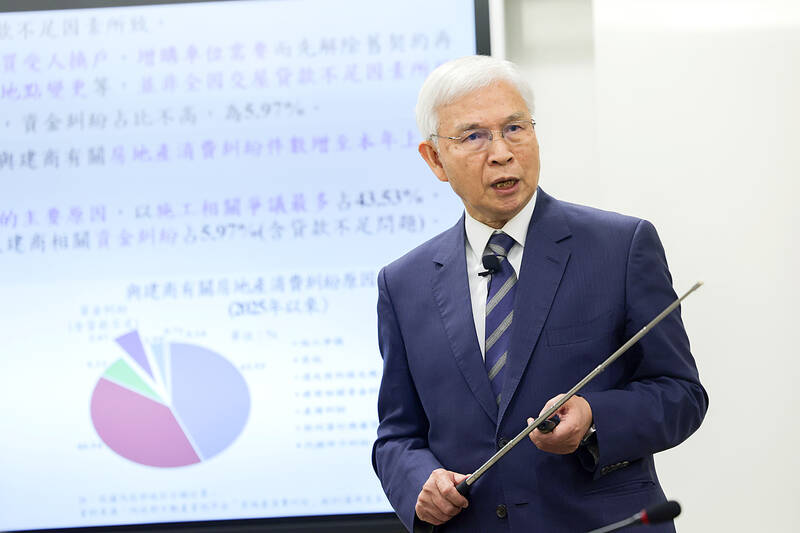The central bank yesterday kept its policy rate at 2 percent and maintained housing loan restrictions, granting only limited flexibility for first-home mortgage applications amid persistent loan concentration concerns.
The bank’s move came after the nation’s GDP growth in the first half of the year reached 6.75 percent, propelled by strong demand for hardware used in artificial intelligence (AI), bank Governor Yang Chin-long (楊金龍) told a news conference in Taipei following the bank’s quarterly board meeting.
Suppliers of hardware for AI products have benefited from the global AI boom, bolstering exports and supporting overall economic activity, Yang said.

Photo: CNA
However, non-technology sectors have seen near-zero growth, weighed down by US tariffs and lingering oversupply in China, underscoring the economy’s divergence and the need for cautious policymaking, he said.
Yang projected growth in the second half of the year to slow to 2.51 percent, leaving full-year GDP at 4.55 percent.
Inflation pressures remain broadly contained, with consumer prices returning to the 2 percent target in the past few months, giving the central bank room to hold rates unchanged even after the US Federal Reserve’s 25-basis-point rate cut over softening employment data.
Still, mortgage lending concentration continues to pose a risk to financial stability, justifying the central bank’s decision to maintain property loan limits, Yang said.
As public frustration grows over insufficient mortgage availability and extended application times following the tightening of lending rules in September last year, the central bank would offer limited support through open market operations, mainly by reducing the issuance of negotiable certificates of deposit, freeing up funds for banks to lend, he said.
A proposed reduction in lenders’ required reserve ratios is seen as less effective, he added.
Many homebuyers have reported insufficient mortgages, averaging 70 percent of purchase prices, down from 80 to 85 percent at earlier contract signing, prompting the Cabinet earlier this month to push for “proper easing” measures.
The Financial Supervisory Commission exempted first-home mortgages from the 30 percent cap on housing loans.
Yang said that measure is sufficient, and the central bank would allow state-run lenders — the primary providers of favorable loans to first-home buyers — some leeway if they miss targets for curbing overall real-estate lending.
Private-sector banks, with greater liquidity, could also step in to help, he added.
Yang described the bank’s monetary stance as “tightening-leaning,” and said that policy adjustments would only be considered if Taiwan’s technology firms — the backbone of exports and GDP growth — show signs of a slowdown.
Looking ahead, demand for emerging technology applications is expected to remain strong, although US tariffs might weigh on global trade, moderating Taiwan’s exports and private investment, he said.
Private consumption could rebound, supporting GDP growth of 2.68 percent next year, Yang said.

In Italy’s storied gold-making hubs, jewelers are reworking their designs to trim gold content as they race to blunt the effect of record prices and appeal to shoppers watching their budgets. Gold prices hit a record high on Thursday, surging near US$5,600 an ounce, more than double a year ago as geopolitical concerns and jitters over trade pushed investors toward the safe-haven asset. The rally is putting undue pressure on small artisans as they face mounting demands from customers, including international brands, to produce cheaper items, from signature pieces to wedding rings, according to interviews with four independent jewelers in Italy’s main

Japanese Prime Minister Sanae Takaichi has talked up the benefits of a weaker yen in a campaign speech, adopting a tone at odds with her finance ministry, which has refused to rule out any options to counter excessive foreign exchange volatility. Takaichi later softened her stance, saying she did not have a preference for the yen’s direction. “People say the weak yen is bad right now, but for export industries, it’s a major opportunity,” Takaichi said on Saturday at a rally for Liberal Democratic Party candidate Daishiro Yamagiwa in Kanagawa Prefecture ahead of a snap election on Sunday. “Whether it’s selling food or

CONCERNS: Tech companies investing in AI businesses that purchase their products have raised questions among investors that they are artificially propping up demand Nvidia Corp chief executive officer Jensen Huang (黃仁勳) on Saturday said that the company would be participating in OpenAI’s latest funding round, describing it as potentially “the largest investment we’ve ever made.” “We will invest a great deal of money,” Huang told reporters while visiting Taipei. “I believe in OpenAI. The work that they do is incredible. They’re one of the most consequential companies of our time.” Huang did not say exactly how much Nvidia might contribute, but described the investment as “huge.” “Let Sam announce how much he’s going to raise — it’s for him to decide,” Huang said, referring to OpenAI

The global server market is expected to grow 12.8 percent annually this year, with artificial intelligence (AI) servers projected to account for 16.5 percent, driven by continued investment in AI infrastructure by major cloud service providers (CSPs), market researcher TrendForce Corp (集邦科技) said yesterday. Global AI server shipments this year are expected to increase 28 percent year-on-year to more than 2.7 million units, driven by sustained demand from CSPs and government sovereign cloud projects, TrendForce analyst Frank Kung (龔明德) told the Taipei Times. Demand for GPU-based AI servers, including Nvidia Corp’s GB and Vera Rubin rack systems, is expected to remain high,